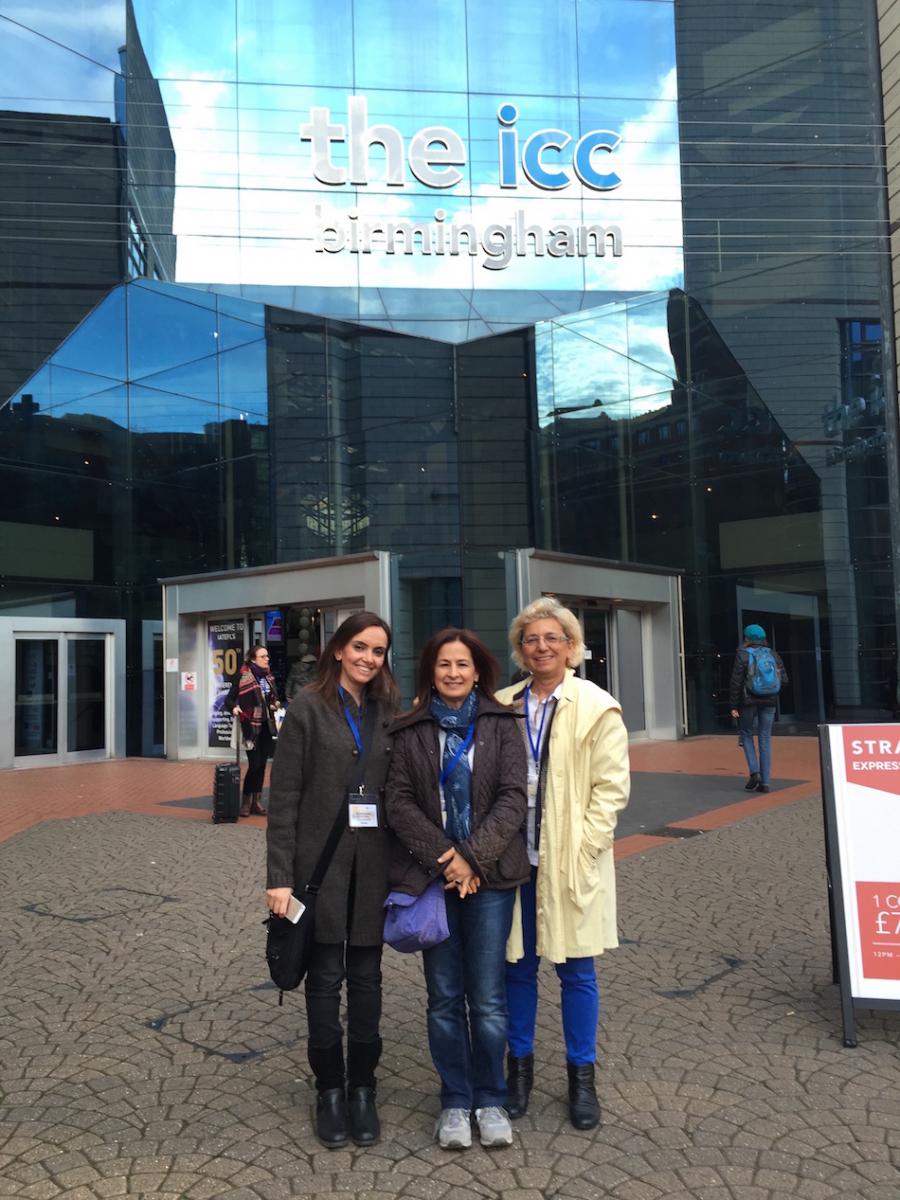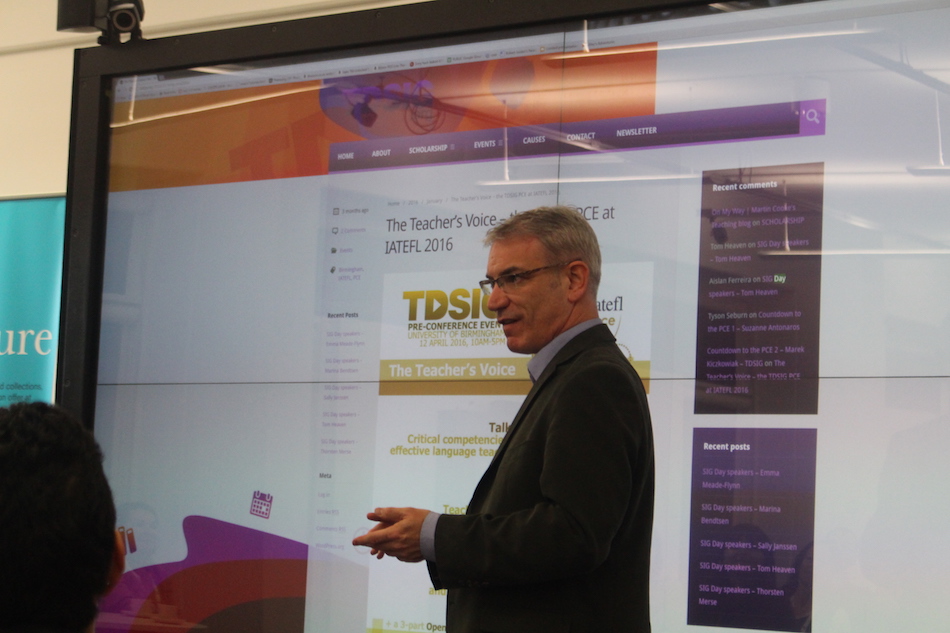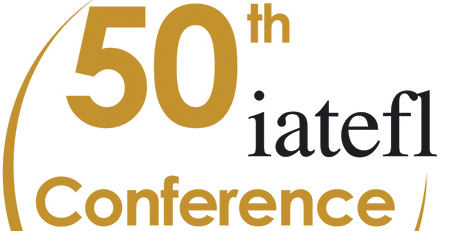
IATEFL 2016: Reviewed by Berna Akpınar, Zeynep İskenderoğlu Önel, Meral Güçeri & Adam Simpson

The 50th incarnation of the annual IATEFL International Conference took place between 13th and 16th April, 2016, in the English city of Birmingham. Recognized as being one of the main events in the English Language Teaching calendar, this year’s conference was attended by over 2,500 language teaching professionals from more than 100 countries, involving an epic 4-day programme of around 500 talks, workshops and symposiums.
The conference was officially opened by the wonderful Professor David Crystal, the patron of IATEFL, with his plenary talk ‘Who would of thought it: The English language 1966-2066’. Emphasizing the inevitability of change, Professor Crystal joked that the language that English teachers spend their entire careers trying to teach just won’t stand still. Indeed, he highlighted a number of contemporary seismic changes that are redefining the English language, including:
• new words that have come into the English language and the changes to our vocabulary (mansplain, slashkinis, digital amnesia, pocket dial, etc.),
• grammatical changes (the decline of modals ‘shall’, ‘must’, ‘may’; the use of state verbs in the continuous aspect; the diminishing use of the relative pronoun ‘which’), and
• changes in pronunciation (the changing attitudes towards different regional accents in the UK, and the changes in the phonetic character of some accents due to the influence of other accents entering the community).
Professor Crystal’s talk was consistently engaging, but also gave warning to the pedants among us not to condemn ‘language change’ as being a case of ‘language deterioration’. In doing so, he highlighted the importance of the globalization of the English language, while also noting that the internet has heralded an era in which there are more bottom-up decisions about spelling, lexis and grammar being made. Nevertheless, he also sent out a warning to the young not to ignore the literary tradition of English and not to necessarily revel in the ‘version’ of English the internet provides.
‘THE ‘NATIVE FACTOR’, The HAVES and the HAVE NOTs’: Plenary by Silvana Richardson. This was one of the best plenary talks at IATEFL as it was an articulate, relevant, research based and informative presentation which everybody has been talking about. The plenary started with this comment:
‘It is often claimed that much has changed in the field of English Language Teaching since 1983, when Peter Medgyes first described the struggle of ‘non-native’ teachers for visibility and due recognition. But has it?’
Silvana examined the current situation of the professional teacher of English whose first or home language is a language other than English. During her plenary she often refered to recent literature and the research studies while providing evidence from her 30 or more years professional experience to discuss whether this attitude to the teachers of an-other language is to be called discrimination. Her job market analysis was highly striking as the discourses that equated the ideal teacher with the ‘native speaker’ have been interrogated and critiqued. Richardson argued whether the situation really changed for the professional teacher of English whose first or home language is a language other than English? In this talk there was room for anecdotal evidence and her own and her colleagues’ personal experiences as well while examining the state of equality and social justice in ELT with reference to the so-called ‘non-native speaker teacher’ concept.
What has been going on in the ELT market for thirty years was described as ‘discrimination’ due to the current discriminatory recruitment policy. Silvana supported her claim by explaining how the logic of the market is used to justify this discriminatory recruitment practices that ‘still perpetuate the view that “ a(n unqualified) native speaker” is preferable to a qualified professional “non-native teacher”.’ She highlighted the impact of the native-speaker bias and its dominance on developments in ELT methodology and its impact on content-appropriate pedagogies.
Silvana Richardson addressed the “‘second best’ view of the ‘non-native teacher’” by emphasizing its impact on their own construction of a legitimate professional identity and on their confidence as teachers or users of “an-other language.” She ended her plenary by saying that she is very proud of her profession and honored to say that she teaches English language which is not her native language.
You are highly recommended visit this link to listen to this inspiring plenary.
Scott Thornbury, author of many groundbreaking ELT grammar books and founder of Dogme, a coursebook-light approach to teaching, was the plenary speaker on the last day of the conference, and his talk ‘1966 and all that: A critical history of ELT’ underlined the importance of not losing sight of what we do: helping our students acquire the skills to use English. While taking us on a little journey of our industry from 1966, Thornbury shows us how easy it is to get distracted with delivering language lessons that focus on the so-called ‘Grammar McNuggets’, which allow for easy accounting and easy testing despite the fact that they may not be the best way of turning our learners into skillful English users.
Other highlights
Thorsten Merse delivered an innovative talk titled “That’s so gay?” – towards a queer-sensitive teacher education.’ His talk was based on the assumption that ELT as a profession is deeply concerned with acknowledging diversity by recognizing the diversity of student cohorts and their multiple identities, or by making socio-cultural diversity a topic for the classroom. More recently, noted Thorsten, there has also been an observable move within ELT theory and practice to pay greater attention to sexual and gender diversity as an integral part of ELT’s pluralistic agenda. Furthermore, at national policy decision-making level in some countries, he gave Germany as an example, teachers across all subjects, including EFL teachers, are now required to engage with lesbian, gay, bisexual and transgender (LGBT) issues in their classrooms.
Those directions in ELT pose an immediate challenge to teacher trainers as they think about how to prepare future and in-service teachers to acknowledge sexual and gender diversity in their teaching practice. Moreover, this is also linked to the question of how we as teachers can develop ELT as a profession further and indeed “keep alive a sense of challenge and satisfaction in our job”, as the TDSIG website says, by incorporating new ideas and impulses. In his talk, Thorsten presented what he conceptualized as a queer-sensitive teacher education. The aim of this new direction in teacher education is to raise future teachers’ awareness of issues of sexual and gender diversity, prepare them to engage learners in reflecting on and negotiating LGBT themes, and to provide them with suitable strategies for queering their teaching practice (e.g. by developing learning tasks or selecting teaching materials). He illustrated these training ideas with specific insights into the teacher training course he taught at the University of Münster in Germany.
Sally Janssen’s great session was entitled ‘Harness gesture: from tool to technique for improved classroom communication’. Her workshop can be summarized thus: ‘Teachers underutilise gesture, and insistent silence. This is not TPR, nor is it The Silent Way – it’s about being aware that what your hands and body are doing carries a lot more communicative weight than we traditionally take advantage of. And it’s ridiculously fun to use this in the classroom, not just as tool, but as technique with directed purpose.’
Sally works as a teacher educator, teacher; she is also a student and artist. She is currently working in Jeddah, Saudi Arabia, where the monolingual beginner level learner is the standard. Her workshop arose from observation of many experienced teachers who were failing to utilize this valuable tool.
Marina Bendtsen delivered the talk ‘Exploring the insider perspective – teachers’ evolving views of teacher learning.’ In her talk, she presented and discussed some of the findings from a qualitative, longitudinal study focusing teachers’ evolving views of teacher learning. Since our perceptions of what and how we learn have been seen to influence what we actually learn in a given situation, Marina noted, it is important that attempts to provide support for teachers’ professional development are based on an understanding of the learners’ perspective.
In her study, she followed a cohort of prospective language teachers (n=20) as they progressed through teacher education and into the workplace. Her data was in the form of narrative essays and interviews and was gathered in three different phases: 1) when the participants were student teachers), 2) after the participants had completed teacher education, and 3) after they had worked 1-2 years as teachers.
Her presentation provided insight into the variety of views expressed by the teachers, regarding what learning opportunities are recognized and valued. Marina also illustrated how the views evolve over time and discuss specific patterns of views connected to the different phases and the different learning contexts (teacher education and workplace learning). Finally, she pointed to specific areas of concern highlighted by the findings and consider some implications for how to support teachers’ professional development during early professional learning.
Finally, Tom Heaven delivered a fantastic session called ‘Spreading the jam: teacher workshops across time zones.’ He explains his session succinctly in this video clip.

